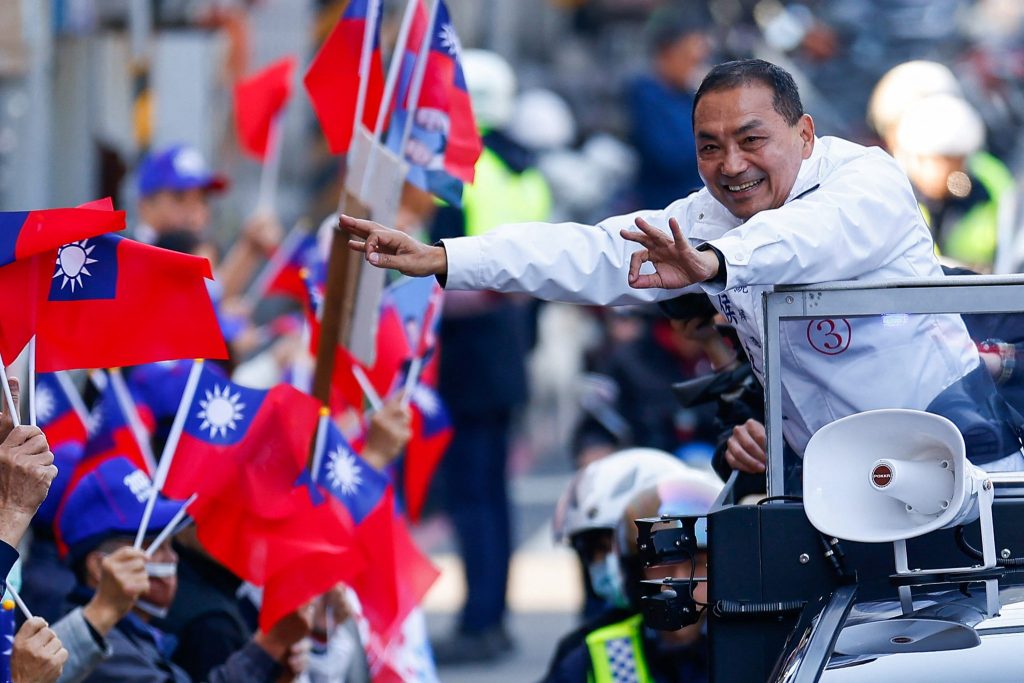On 13 January 2024, Taiwanese citizens will elect their next president and members of the Legislative
Yuan. The incumbent President Tsai Ing-wen of the pro-independence Democratic Progressive Party
(DPP) is not running due to term limits.
Two opposition parties attempted to form an alliance to unseat the ruling DPP. But the plan fell apart due to disagreements over who would head the ticket as presidential candidate. With the subsequent withdrawal of Terry Gou — the billionaire founder of tech giant Foxconn — from the presidential race, Taiwan’s 2024 presidential election is effectively a three-way race.
The main contenders are Lai Ching-te of the ruling DPP, Hou Yu-ih of the opposition party, the Kuomintang (KMT), and Ko Wen-je, chair and founder of the minor Taiwan People’s Party (TPP).
The DPP’s Lai has strong pro-independence credentials and currently serves as Taiwan’s vice president. He has been leading in the polls since July.
As the mayor of New Taipei City, the KMT’s Hou is not a particularly dynamic or forceful candidate and has little experience at the national and international levels. He has endorsed the 1992 Consensus — which implies that both Taiwan and the Chinese mainland belong to one China without specifying what ‘China’ means. But Hou is perceived as feeble in his commitment to this cross-Strait policy that is important to KMT heavyweights like former president Ma Ying-jeou.
Ko of the TPP is a medical doctor turned politician who recently completed his second term as mayor of Taipei. He positions himself as an anti-establishment outsider, and his straight-talk and terse soundbites are well-received among young voters who resent the traditional political divide between the ‘pan-Blue’ and ‘pan-Green’ political camps headed respectively by the KMT and DPP. To brand himself as an alternative ‘third force’, Ko emphasises that his cross-strait policy would be guided by the principles of ‘deterrence and communication’.
Though the ‘China factor’ remains the key political cleavage in society, and the most important factor affecting citizens’ electoral behaviour, it has not been as big of a campaign issue in the 2024 elections as in the 2020 polls.
Chinese President Xi Jinping’s 2019 policy address on a ‘Taiwan plan’ and Beijing’s subsequent repressive responses to the Hong Kong protests provided an opportunity for President Tsai Ing-Wen to burnish her image as a defender of Taiwan’s sovereignty and democracy. The China factor revived her flagging electoral prospects and led to her landslide victory in the 2020 election.
Instead of amplifying Beijing’s threats, Tsai now downplays them even though Chinese leaders have intensified their military pressure. DPP leaders seem to worry that the KMT’s narrative that the upcoming election is a choice between war and peace may negatively impact Lai’s chance of winning.
The Lai campaign has rarely discussed Chinese military threats other than countering the KMT’s narrative by framing the election as a choice between democracy and autocracy. To ease citizens’ concerns that another DPP administration would invite a violent response from Beijing, Lai has moderated his pro-independence positions and emphasised that he would continue Tsai’s cautious approach towards the relationship between Taiwan and China.
Believing that cross-strait exchanges can bring economic and political dividends to Taiwan, engagement with China has always been the KMT’s cross-strait policy. This may explain why Hou has proposed to revive the Cross-Strait Service Trade Agreement, opposition to which culminated in massive 2014 protests known as the Sunflower Movement. But the engagement proposition may be difficult to sell considering that less than 40 per cent of Taiwanese citizens now support the 1992 Consensus — a decline of more than 20 per cent since 2019.
With Taiwanese living under constant military threat for several decades, Beijing’s persistent pressure has become a nuisance that invites resentment. As a result, the ‘war and peace’ narrative has yet to resonate with voters. This is not to say that Taiwan’s citizens do not worry about the China threat. But pocketbook issues — including stagnant wages, a shortage of affordable housing and meagre career prospects — appear to attract more attention, particularly among the younger generation.
Although the ‘China factor’ appears to have been overshadowed by the economy in the 2024 presidential campaign, Beijing has still inserted itself in the process, knowing that Lai’s victory would mean Taipei continuing its policy of demonstrating the island’s independent and separate status in the international community.
Attempting to influence electoral outcomes, Chinese leaders have continued their military pressure on Taiwan and magnified the ‘war and peace’ narrative. It was reported that the Chinese government has also been spreading disinformation to discredit DPP candidates, and it has applied a new round of economic coercion measures on Taipei. After Xi Jinping repeated the message that China’s ‘reunification’ with Taiwan is inevitable, a senior mainland official warned the island’s citizens to make a ‘correct choice’ in the upcoming elections.
Beijing’s efforts so far have yet to sway public opinion. Lai continues his lead in the polls, as contenders of the other two parties trail behind. Past experience has shown that the Chinese government’s threats and overt endorsements almost always invited opposite outcomes. In addition to contributing to President Tsai’s landslide victory in the 2020 election, Beijing’s hard-line policies also backfired in the 1996 and 2000 presidential elections as candidates of whom Chinese leaders disapproved got elected.
Most Taiwanese have no desire to be part of China. Beijing’s repressive responses to Hong Kongers’ quest for democracy have further alarmed many on the island. All indications show that that Chinese leaders will continue their uncompromising policy toward Taiwan — and the history of tense and chilly cross-Strait relations under DPP leadership may repeat itself should Lai win the election on 13 January.
T.Y. Wang is University Professor and Department Chair of Politics and Government at Illinois State University, Co-editor of The Journal of Asian and African Studies and Co-editor of The Taiwan Voter.

